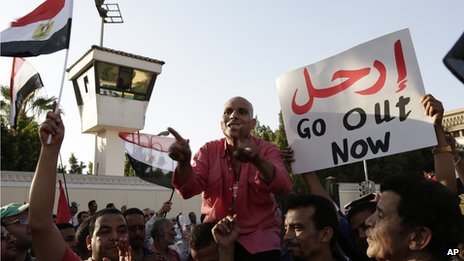Muslim Brotherhood supporters in Egypt begin a series of open demonstrations on Friday, two days before the protests of opposition groups planned for June 30 to demand the departure of President Mohammad Mursi.
 Muslim Brotherhood supporters in Egypt begin a series of open demonstrations on Friday, two days before the protests of opposition groups planned for June 30 to demand the departure of President Mohammad Mursi, as they believe he failed to run the country during his first year in office.
Muslim Brotherhood supporters in Egypt begin a series of open demonstrations on Friday, two days before the protests of opposition groups planned for June 30 to demand the departure of President Mohammad Mursi, as they believe he failed to run the country during his first year in office.
In the perimeter of Rabea Adaweya Mosque in Nasr City,Muslim Brotherhood and other Islamist movements organized million-man demonstration under the banner of "Legitimacy is Red Line" to defend the president's policy and reject the opposition's attempts to carry out what they called ‘coup’ in the country.
Islamist activists began early morning to arrive at the scene and set up tents in preparation for the sit-in. In turn, the Egyptian army sent reinforcements to major cities in the country in anticipation of the protests planned by the ‘June 30 Front’ that will demand the departure of Mursi and the Muslim Brotherhood from power.
The Egyptian presidency announced that the deployment of military personnel is being coordinated, but the opponent protesters are hoping that armed forces will protect them from attacks by supporters of the Islamist forces, while some Islamist activists accuse the opposition of preparing to carry out a military coup in the country.
The death toll from clashes earlier this week between supporters and opponents of Mursi in the Egyptian Nile Delta has climbed to five as Egyptian security officials say that one person was killed in street fighting between supporters and opponents of Egypt's Islamist president.
For its part, the Zionist foreign ministry called its settlers on Friday not to visit the Egyptian territories during this period until the political crisis resolved.
Mursi had delivered a speech on Thursday in which he talked about the results achieved after his first year in office. In spite of his acknowledgment of committing mistakes, the president accused the opposition of failing to cooperate with the authorities and accused some opposition figures of corruption, including his opponent in the second round during the presidential election, Ahmad Shafiq.
Mursi also drew sharp criticism to certain judges who oppose him, noting that they cheated in the elections during Mubarak’s era.
The Egyptian Defense Minister Abdel Fattah al-Sisi has given Mursi and his opponents a one-week period to reach an understanding in order to avoid bloodshed. He also warned that the army will intervene to protect Egypt and its people from slipping into "a dark tunnel” unless a political consensus took place.
Preparations for mass protests come at the time the country suffers an acute shortage of fuel and electric power, and high prices of consumer goods and services amid decline in the Egyptian pound value.
The opposition hopes that it will be able to force Mursi to step down by gathering mass crowds of opponents who will participate in the demonstrations, while the president's supporters accuse them of trying to achieve what they failed to accomplish during the elections, through the coup.